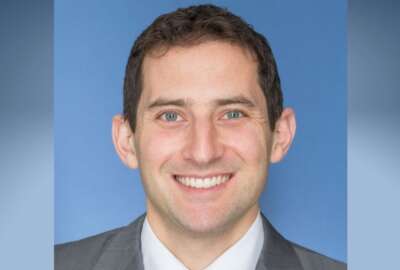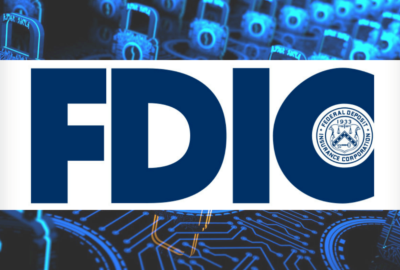New FDIC director breaks down what it takes to stay abreast of financial challenges
The Federal Deposit Insurance Corp. often makes headlines when financial disasters occur. It also performs daily work of bank examination, policy development and...
Best listening experience is on Chrome, Firefox or Safari. Subscribe to Federal Drive’s daily audio interviews on Apple Podcasts or PodcastOne.
The Federal Deposit Insurance Corp. often makes headlines when financial disasters occur. It also performs daily work of bank examination, policy development and making banking data available to the public. Behind all of that is the division of administration which keeps the whole thing going. For a behind-the-curtain look, the Federal Drive with Tom Temin turned to the newly-appointed Director of Administration Daniel Bendler.
Interview transcript:
Tom Temin: What’s it like to be the un-famous in charge of the unseen parts of an agency that’s often very much out there in the public, especially everybody uses banks?
Dan Bendler: Well, as you pointed out, the FDIC has a very outward public facing persona. But behind that an awful lot of outstanding professional employees who make this corporation run, who do all the behind the scenes work, that turn the lights on, work on contracts, hire employees, provide our standard of living at the FDIC, and overall, just make this a great place to work. And so to be in this position, right now, to lead one of our support organizations in the Division of Administration. It’s just very, very exciting.
Tom Temin: And you’ve been there a long time. And in that period of time, the nation has gone through a couple of banking and financial crises where maybe the resolutions numbers rise sharply, and then fall back to normal. What’s it like? Is it a roller coaster in there in the administrative office? Or does it pretty much tick along, regardless of what’s going on externally?
Dan Bendler: It’s a combination of both. So we are challenged and have opportunities for our steady state operations. So during peacetime, where we are now our banks are doing great, and we have very few failures. We still bring on employees, we award contracts, we make sure our leases and facilities are first class. But you know, we say here at the FDIC that readiness never takes a holiday. So even during peacetime, and should I say especially during peacetime, we are preparing for the next crisis. And it doesn’t necessarily have to be a financial crisis could be a cyber event, it could be natural disaster. So within the Division of Administration, we never rest, we never can breathe easy. We’re always looking forward, always preparing for the next crisis.
Tom Temin: It strikes me that one of those crises could be a major bank or a chain in some city that is itself hit with a ransomware attack, which is an unusual type of situation that would invoke FDIC activity, because it’s not as if they made bad loans or somehow had a liquidity crisis. This would be something like a meteor striking a bank.
Dan Bendler: That’s absolutely right. So it’s a whole new world. And there are new threats that we never could have imagined, even five years ago, much less 10 years ago. So repositioning ourselves and bringing on the type of talent, the quality disciplines, and background to manage through these risks. I prepare us to deal with this type of crisis. Tom, man, it’s a little bit scary on the one hand, but it’s also really exciting. And it’s just about being ready, paying attention, making sure we’re well trained, that we’re talking to our employees, that we’re talking to our banks and other regulators that we are well positioned, well poised to step in, if needed.
Tom Temin: And I guess you’ve implied the answer to this question, but I want to ask it explicitly. The name Division of Administration could apply in any administrative part of any agency doing any mission. To what extent does banking, and banking oversight, and banking regulation, and banking resolution if that’s needed, imbue into administration at the FDIC?
Dan Bendler: So at the FDIC, and I know the Division of Administration has different names in different departments or agencies, but at FDIC, DOA encompasses the agency’s really four main areas: one, human resources, all things related to hiring, promoting, paying, employees benefits, all of the things that make us a best place to work at the FDIC. So that’s our benefits in our HR group. We also have contracting. The FDIC relies on goods and services to supplement our talent, our needs here at the FDIC. So we are responsible for procuring goods and services in the marketplace in a competitive way. And then we have our Corporate Services Branch, and we handle in CSB are finding and acquiring the best leased space around the country for our regional and field offices and headquarters. Security, making sure our employees are safe. Simple things that you don’t think about every day office supplies, library services, that type of thing. And they truly are within our corporate services group responsible for FDIC’s very high standard of living which allows us to attract a very high caliber employee. Then we have a risk management and audit resolution group, as well. So really covers the waterfront. IT, the CIO is handled in a different part of the organization. But boy, we sure do partner strongly with those other organizations with legal, with IT, dvision of finance, in a very collaborative way.
Tom Temin: We’re speaking with Dan Bendler. He is the newly appointed director of the Division of Administration at the FDIC. And just tell us a little bit about yourself. You’ve been at the FDIC a long time, what attracted you to federal service? And what keeps you with the FDIC?
Dan Bendler: Well, Tom, I started my federal career at Department of Treasury at the Office of Inspector General as an auditor. And, that was around the time of the S&L crisis. And I was so intrigued by that, I remember standing in line with my grandmother at a savings and loan institution in Baltimore. She was trying to get her money. And I was extremely worried about that.
So I transitioned from Treasury to the Resolution Trust Corporation, RTC, also in the Office of Inspector General. It was a fantastic opportunity, great job traveling around the country. And then kind of gravitated around the agency, FDIC, when we merged with RTC, and worked in various roles, different capacities. And just, I never would have imagined that I would have stayed in the same organization for as long as I have. But it’s been such an incredible opportunity that the people, the challenges, the opportunities, just really intrigued me. And, you know, time goes by pretty quick. So here I am.
Tom Temin: And listeners can’t see us talking over a video conferencing platform, but you are in the office. I can see that federally issued furniture right there behind you. And on either side of you. How has the pandemic affected the administration office of FDIC?
Dan Bendler: In really quite a profound way. We have like other agencies and departments, we’ve been mostly at a mandatory telework capacity, which means we’ve had to pivot on a dime, and learn how to do everything that we’re accustomed to doing here at the office, remotely. Onboarding, facilities management, we still have to work contracts. And that’s not something that we can simply put off, right? So it really required us to be innovative, creative, resilient, look at things differently, and always move forward. We’ve relied heavily on technology, partnering with our other organizations to get the job done. And that has been the case throughout the FDIC. So yes, today I snuck into the office for a change of scenery and get away from my young dog who insists on playing constantly while I’m working at home. But most FDIC employees right now are either in a hybrid work environment or mostly working at home.
Copyright © 2024 Federal News Network. All rights reserved. This website is not intended for users located within the European Economic Area.
Tom Temin is host of the Federal Drive and has been providing insight on federal technology and management issues for more than 30 years.
Follow @tteminWFED






